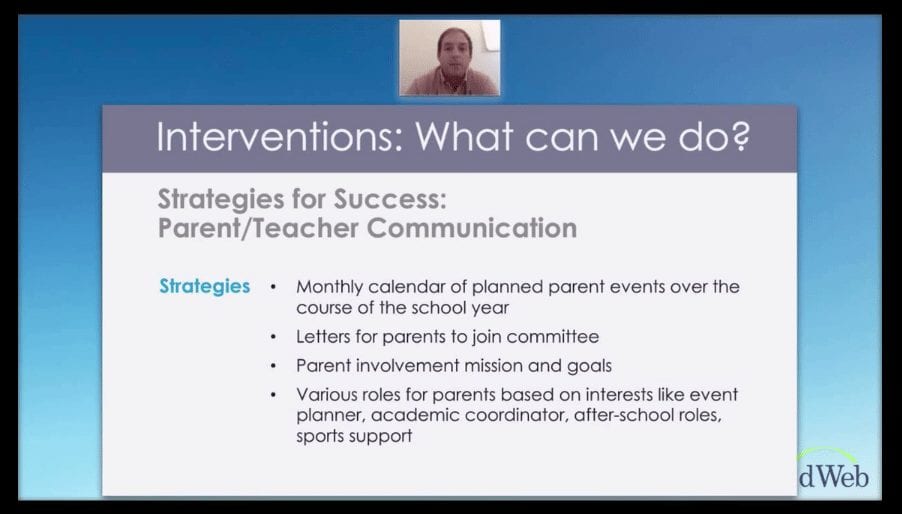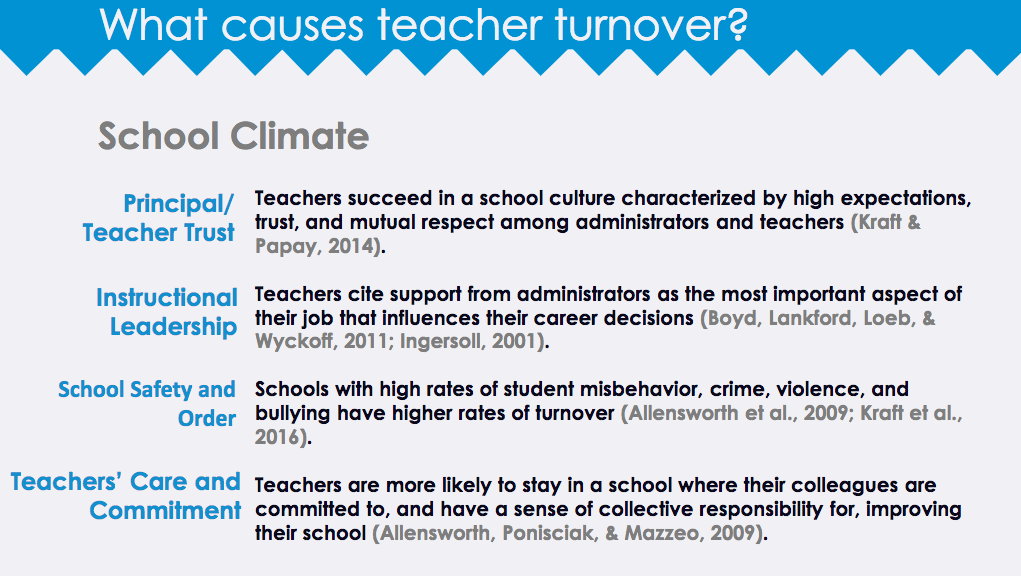Combat Teacher Turnover with Data and Interventions
Teacher turnover has an impact on all stakeholders in the school environment, and research shows that students struggle to perform well in schools with turnover year after year. Retaining effective staff can be a big challenge for schools and districts, as can figuring out how to solve the issues around this problem. In “Using Data to Combat Attrition and Keep Good Teachers,” Henry Wellington, CEO and founder of Upbeat, discussed issues that cause teacher turnover and how schools and districts can intervene.
Although 30% of teachers leave for reasons outside of schools’ control, the other 70% are leaving due to issues that occur within the school environment, and lack of data makes it difficult to find out why. Without data on the school or district, it’s hard for school leaders to gauge the significance of individual complaints, even if the complaint is valid. It’s also challenging to understand the factors that influence turnover for different types or demographics of teachers. Last, teacher survey data can often be unreliable if it is not anonymous.
Teacher turnover can be caused by a variety of factors involving school climate, instructional leadership opportunities, school resources and practices, and individual characteristics of the teacher. Examples of issues influencing turnover include principal/teacher trust, influence in school administration, quality of professional development, collaboration with colleagues, and other characteristics like work-life balance. External stakeholders, like parents, also have a large role in the school and teachers must be satisfied with the communication between them. Henry suggested, “This can be gauged by asking teachers, do they think that parents and teachers at their school think of each other as partners?”
So how can we begin to address teacher turnover? Getting feedback from teachers on the staff culture is essential, and teachers should also be involved in reviewing that data since they are closest to the issues. “Gathering data and discussing it with your staff in an organized format can unearth significant ideas about improvements that can be made around staff culture,” he said. There should also be an action plan, and school leaders should be communicating updates to staff on a regular basis throughout the year.
There are many strategies to combat teacher turnover. School leaders can talk to teachers to figure out what’s lacking, and then form a committee in that area to bring teachers into the policy development process, giving them more influence in the school administration. Schools can issue get-to-know-you surveys, or have principal office hours or open-door policies to improve principal/teacher trust. To strengthen parent/teacher communication principals can create curriculum with clear opportunity for parent involvement for the entire year, and provide parents opportunities to support the school in ways that work for them. With the right data, schools and districts can figure out areas in need of improvement and create plans to intervene.
This broadcast was hosted by edWeb.net and sponsored by Noodle Markets.
This article was modified and published by eSchool News.
About the Presenter
Henry Wellington founded Upbeat—an organization that uses predictive analytics to enhance schools’ approach to teacher retention. Before starting Upbeat, Henry played a key role in the implementation of blended learning and evaluation of education technology products for Citizen Schools. Prior to Citizen Schools, Henry supported education technology companies in their sales and marketing strategies at Whiteboard Advisors. He also taught middle school special education in New York City District and charter schools before his time at Whiteboard Advisors.
About the Host
Brent Lomas is a former classroom teacher and policy researcher. He now develops Noodle Markets’ marketing strategy, including editorial, collateral, and social channels. Prior to joining the team, Brent worked in Broadway advertising at SpotCo and contributed to BuzzBuzzHome’s news wing, specializing in NYC housing development and legislation. He serves on the advisory boards of En Garde Arts and Circle in the Square’s Teens on Broadway program. A Teach for America alum, Brent taught at Aspire Public Schools and Harlem Village Academies. He received his BA in communication from the University of Southern California and his M.Ed. in Urban Schooling from the University of California, Los Angeles.
Join the Community
InsideK12: Boost Your K12 Purchasing IQ is a free professional learning community that seeks to empower K-12 stakeholders with knowledge of hidden factors affecting our schools.






Comments are closed.